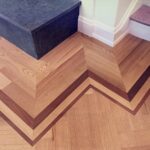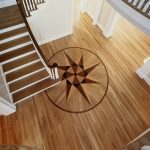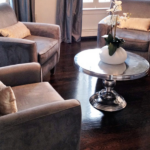There is no doubt that hardwood floors can be stunning, but when floors start to squeak, you may find yourself feeling less admiration for your floor’s natural beauty and much more frustration with these irritating noises. Thankfully, there are ways to silence a squeaky floor. As hardwood flooring experts, we have diagnosed and treated many squeaky floors in the Greater Boston area.
When we get called onto a floor restoration or project, clients will often talk about squeaky floors and how the noise has become a nuisance in their home and something they cannot ignore.
If you notice your floor making creaking and squeaking noises, take a few moments to listen to what it’s trying to tell you. Below are four common problems your floor may be “communicating” to you!
4 Things Your Floor Says When It Squeaks:
-
The Weather has Changed, and It’s Uncomfortable
Seasonal squeaks are incredibly common. It’s not unusual for floorboards to swell or expand as a result of temperature and humidity changes. When you notice squeaking in your floor, your first step should be to check the relative humidity levels in your home. Gaps can also be an indicator that the humidity levels are off.
These seasonal squeaks usually tend to fix themselves once the weather shifts again. However, this problem can be avoided by keeping your home at a stable level of humidity. 40 to 60% is an ideal humidity level, especially for rooms with hardwood flooring. Seasonal squeaks serve as a good reminder to turn on your humidifier and keep up on necessary maintenance.
Don’t Like Dust in Your Home?
Learn About Dustless Floor Refinishing!
-
Joist Problems
Joists are horizontal bars beneath the floor and subfloor that form the framework of the flooring. When properly functioning, joists stabilize the subfloor and prevent unwanted movement. If there are problems with your joists, such as warping, loose flooring, and squeaks are likely to result.
If you think your squeaky flooring is due to joist problems, you will need to access the space beneath the flooring to confirm. From your basement, for example, you will be able to identify any issues by looking up at the joists. You can then stabilize any warped joists with planks to prevent further movement.
-
Subfloor Problems
Uneven subfloors are one of the most common issues that can cause a noisy floor. When the subfloor is not level, undesirable space between the top floor and subfloor can result. This can cause those irritating squeaks, along with other more serious issues.
The best way to fix this problem is to secure the subfloor to the top floor. Securing a subfloor can be done by screwing them in place from the underside of the flooring or from above. Still, it’s only recommended that professionals perform this kind of work for safety and quality concerns.
-
Something More Serious is Wrong
Prolonged squeaking could indicate that there is something more serious going on with your flooring. If your floors continue to squeak well past any seasonal changes or you simply don’t feel comfortable making repairs yourself, then you should call a professional.
Contact us if you have any questions regarding hardwood floor installation or hardwood floor refinishing!






